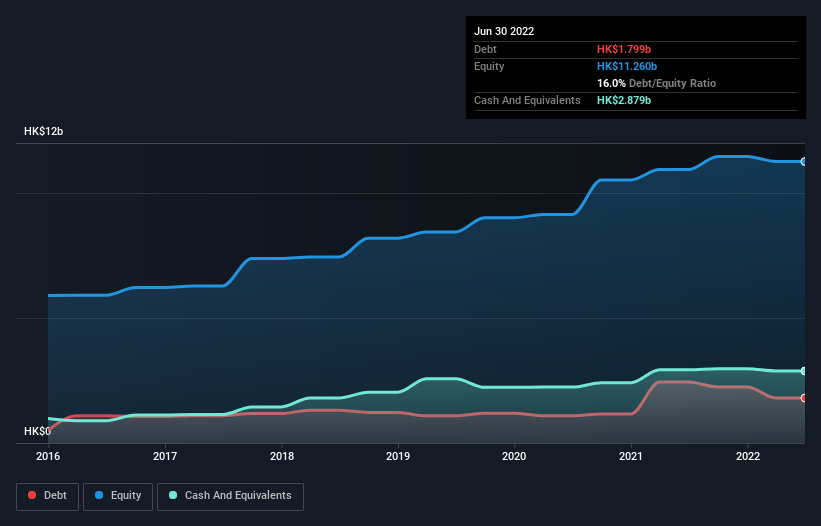
Some say volatility, rather than debt, is the best way to think about risk as an investor, but Warren Buffett famously said that 'Volatility is far from synonymous with risk.' When we think about how risky a company is, we always like to look at its use of debt, since debt overload can lead to ruin. As with many other companies Wai Kee Holdings Limited (HKG:610) makes use of debt. But the more important question is: how much risk is that debt creating?
Why Does Debt Bring Risk?
Debt and other liabilities become risky for a business when it cannot easily fulfill those obligations, either with free cash flow or by raising capital at an attractive price. Ultimately, if the company can't fulfill its legal obligations to repay debt, shareholders could walk away with nothing. However, a more common (but still painful) scenario is that it has to raise new equity capital at a low price, thus permanently diluting shareholders. By replacing dilution, though, debt can be an extremely good tool for businesses that need capital to invest in growth at high rates of return. The first thing to do when considering how much debt a business uses is to look at its cash and debt together.
Our analysis indicates that 610 is potentially undervalued!
How Much Debt Does Wai Kee Holdings Carry?
You can click the graphic below for the historical numbers, but it shows that Wai Kee Holdings had HK$1.80b of debt in June 2022, down from HK$2.44b, one year before. However, it does have HK$2.88b in cash offsetting this, leading to net cash of HK$1.08b.

A Look At Wai Kee Holdings' Liabilities
The latest balance sheet data shows that Wai Kee Holdings had liabilities of HK$5.06b due within a year, and liabilities of HK$1.34b falling due after that. On the other hand, it had cash of HK$2.88b and HK$3.42b worth of receivables due within a year. So these liquid assets roughly match the total liabilities.
Given Wai Kee Holdings has a market capitalization of HK$1.39b, it's hard to believe these liabilities pose much threat. But there are sufficient liabilities that we would certainly recommend shareholders continue to monitor the balance sheet, going forward. While it does have liabilities worth noting, Wai Kee Holdings also has more cash than debt, so we're pretty confident it can manage its debt safely.
On top of that, Wai Kee Holdings grew its EBIT by 70% over the last twelve months, and that growth will make it easier to handle its debt. There's no doubt that we learn most about debt from the balance sheet. But you can't view debt in total isolation; since Wai Kee Holdings will need earnings to service that debt. So if you're keen to discover more about its earnings, it might be worth checking out this graph of its long term earnings trend.
Finally, a company can only pay off debt with cold hard cash, not accounting profits. Wai Kee Holdings may have net cash on the balance sheet, but it is still interesting to look at how well the business converts its earnings before interest and tax (EBIT) to free cash flow, because that will influence both its need for, and its capacity to manage debt. During the last three years, Wai Kee Holdings burned a lot of cash. While that may be a result of expenditure for growth, it does make the debt far more risky.
Summing Up
While it is always sensible to look at a company's total liabilities, it is very reassuring that Wai Kee Holdings has HK$1.08b in net cash. And it impressed us with its EBIT growth of 70% over the last year. So we are not troubled with Wai Kee Holdings's debt use. There's no doubt that we learn most about debt from the balance sheet. However, not all investment risk resides within the balance sheet - far from it. Case in point: We've spotted 3 warning signs for Wai Kee Holdings you should be aware of, and 1 of them is a bit unpleasant.
If, after all that, you're more interested in a fast growing company with a rock-solid balance sheet, then check out our list of net cash growth stocks without delay.
If you're looking to trade Wai Kee Holdings, open an account with the lowest-cost platform trusted by professionals, Interactive Brokers.
With clients in over 200 countries and territories, and access to 160 markets, IBKR lets you trade stocks, options, futures, forex, bonds and funds from a single integrated account.
Enjoy no hidden fees, no account minimums, and FX conversion rates as low as 0.03%, far better than what most brokers offer.
Sponsored ContentValuation is complex, but we're here to simplify it.
Discover if Wai Kee Holdings might be undervalued or overvalued with our detailed analysis, featuring fair value estimates, potential risks, dividends, insider trades, and its financial condition.
Access Free AnalysisHave feedback on this article? Concerned about the content? Get in touch with us directly. Alternatively, email editorial-team (at) simplywallst.com.
This article by Simply Wall St is general in nature. We provide commentary based on historical data and analyst forecasts only using an unbiased methodology and our articles are not intended to be financial advice. It does not constitute a recommendation to buy or sell any stock, and does not take account of your objectives, or your financial situation. We aim to bring you long-term focused analysis driven by fundamental data. Note that our analysis may not factor in the latest price-sensitive company announcements or qualitative material. Simply Wall St has no position in any stocks mentioned.
About SEHK:610
Wai Kee Holdings
An investment holding company, operates in the construction and infrastructure industries in Hong Kong and the People’s Republic of China.
Excellent balance sheet and good value.
Similar Companies
Market Insights
Community Narratives




